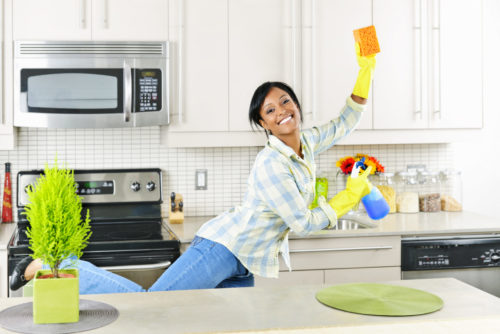Health care providers and researchers are learning a lot about coronavirus and how it spreads. Public health messages emphasize the importance of frequent, thorough hand washing and social distancing to slow spread of the virus. There are additional steps your can take in your home to fight coronavirus transmission inside your house. No special supplies are required. You probably already have what you need.
How can I prepare my home?
You can reduce potential spread of COVID-19 by cleaning and disinfecting frequently touched surfaces, including as faucets, doorknobs, handles, tables, light switches, desks, toilets and sinks. Do this daily if someone in your house has COVID-19.
First, put on gloves before cleaning and disinfecting—preferably the disposable kind you can throw away right after you finish. If you have only reusable gloves, don’t use them for any other purposes. Thoroughly wash your hands after removing your gloves. Cleaning with soap and water removes dirt and lowers the number of germs on surfaces. Once surfaces are clean, you can apply disinfectant to knock out any germs left behind.
What disinfectants kill COVID-19?
The Environmental Protection Agency has a list of disinfectants that are effective against coronavirus. Although these products haven’t been tested against this specific virus, they’re known to work against other, harder-to-kill viruses. Choose products with active ingredients ethanol, hydrogen peroxide or quaternary ammonium. In the U.S., check labels for EPA registration numbers. Read and follow product instructions, including what precautions to take when using the product. Many disinfectants need to remain on surfaces for some time to be effective. This is called the contact time. Check the label for specifics. Make sure you have good airflow in the room when you’re using any type of disinfectant.
Does bleach work against COVID-19?
You can make a disinfecting solution by combining 4 teaspoons of household bleach and 1 quart of water. Wear gloves and make sure there’s good airflow in the room. Don’t mix bleach with ammonia or any other cleanser because the combination could produce toxic fumes.
Can coronavirus get on my clothes and, if so, will tossing them in the laundry kill the virus?
The answer to the first half of this question is probably not. Experts say droplets containing coronavirus—the kind that come from a cough or sneeze—usually fall to the floor before landing on your clothing. So it’s not imperative that you launder your clothes when you come in from the pharmacy or grocery store. If someone sneezes directly on your shirt while you’re shopping, you should take off the clothes as soon as you get home, toss them in the laundry (laundry detergent and water, followed by a regular dryer cycle, is enough to kill the virus) and take a shower. One caveat: If you’re caring for someone with COVID-19, wash their clothes and bedding on the warmest water setting possible and dry thoroughly.
Should I clean my shoes when I come inside?
A recent study from China found folks who work in hospitals found half the workers had coronavirus on their shoes, which makes sense since they are around a lot of infected patients. Your shoes should be fine. Still worried? Take off your shoes before you enter your house and leave them outside overnight; this type of virus dries out and decays relatively quickly. You can also throw washable shoes in with the laundry.
How can I disinfect phones and other electronics?
Follow manufacturers’ instructions for cleaning and disinfecting. Otherwise, you can clean cell phones with disinfecting wipes that are 70% alcohol. Wipe the face of the phone and along the sides and back where you hold it. Let it air dry. The same goes for computer keyboards, laptops, tablets and remote controls. Wash your hands thoroughly when you’re done.
Can I get coronavirus from the mail?
Experts suggest the risk of getting sick from your mail or packages is low. So far, there are no documented cases of anyone contracting coronavirus from their mail or opening a package. But we’re still learning a lot about this novel coronavirus, so if you’re still worried, wash your hands for at least 20 seconds after opening mail or packages. Still anxious? Let mail and packages sit for 24 hours before opening.






